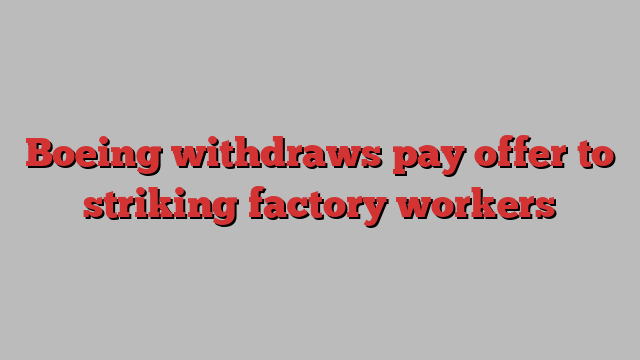
Unlock the Editor’s Digest for free
Roula Khalaf, Editor of the FT, selects her favourite stories in this weekly newsletter.
Boeing has withdrawn its pay offer to striking machinists as negotiations between the aircraft maker and union members stall and the company’s debt teeters on the edge of a junk rating.
“Our team bargained in good faith,” Stephanie Pope, chief executive of Boeing Commercial Airplanes, wrote to employees in a letter released late on Tuesday. “Unfortunately, the union did not seriously consider our proposals.”
The International Association of Machinists and Aerospace Workers District 751 said in an update on its website that Boeing was “hell-bent” on sticking to its now-rescinded offer made on September 23.
On Tuesday, S&P Global Ratings put the company’s triple B minus credit and senior unsecured debt ratings on a negative credit watch. Anything below triple B minus is considered a junk credit rating.
“The CreditWatch listing reflects the increased likelihood of a downgrade if the strike persists toward the end of the year,” S&P said.
Boeing’s September 23 offer sparked fury among the 33,000 IAM members employed by the plane maker who have been on strike since September 13. The union said the 30 per cent pay increase offered by the company circumvented normal bargaining by taking the offer directly to workers.
“When we surveyed our members on that offer, the response was overwhelming — those who participated said it was not good enough,” IAM said on Tuesday.
The union added that Boeing, in its most recent negotiations, “refused to propose any wage increases, vacation/sick leave accrual, progression, ratification bonus [and] also would not reinstate the defined benefit pension”.
Pope, in withdrawing Boeing’s pay offer, said IAM “made non-negotiable demands far in excess of what can be accepted if we are to remain competitive as a business”.
IAM’s original demand was for a 40 per cent pay rise, as well as improved conditions. The machinists’ pay has risen 4 per cent over the past eight years.
Boeing is struggling to improve its finances and operations after five punishing years that included two fatal crashes, a pandemic that curtailed travel demand and, most recently, an incident in which a door panel blew off one of its aircraft mid-flight.
The company has used billions of dollars in cash this year as it has slowed production to try to improve its manufacturing and quality processes. Analysts have said the company is also considering issuing equity of about $10bn to shore up its cash position.
Shares of Boeing are down about 5 per cent since the strike began on September 13.
Additional reporting by Claire Bushey in Chicago